Business Communication Reflective Essay: Course and Career Goals
VerifiedAdded on 2023/06/03
|9
|2650
|184
Essay
AI Summary
This reflective essay explores business communication concepts discussed in a business administration course. The essay is divided into three sections, starting with an introduction to effective communication and its role in achieving career goals. The first section analyzes weekly topics, including verbal and non-verbal communication, business writing, and intercultural communication. The second section provides a literature review focusing on business writing and its significance in professional settings, drawing from academic journals. The final section demonstrates the application of communication concepts to future career development, emphasizing ethical communication, listening skills, and the importance of both verbal and non-verbal interactions. The essay concludes by highlighting the impact of globalization and the need to master business communication skills for success.
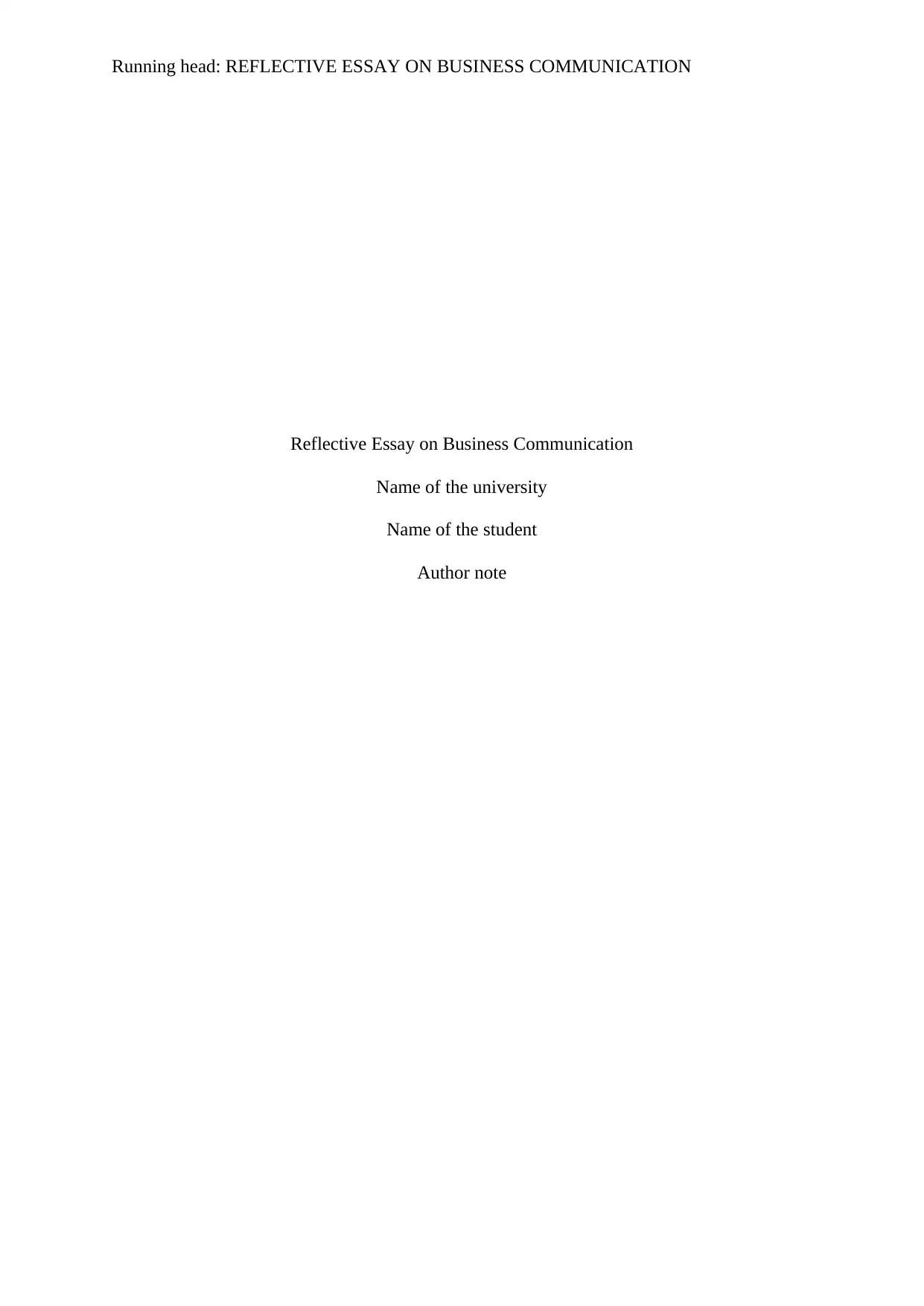
Running head: REFLECTIVE ESSAY ON BUSINESS COMMUNICATION
Reflective Essay on Business Communication
Name of the university
Name of the student
Author note
Reflective Essay on Business Communication
Name of the university
Name of the student
Author note
Paraphrase This Document
Need a fresh take? Get an instant paraphrase of this document with our AI Paraphraser
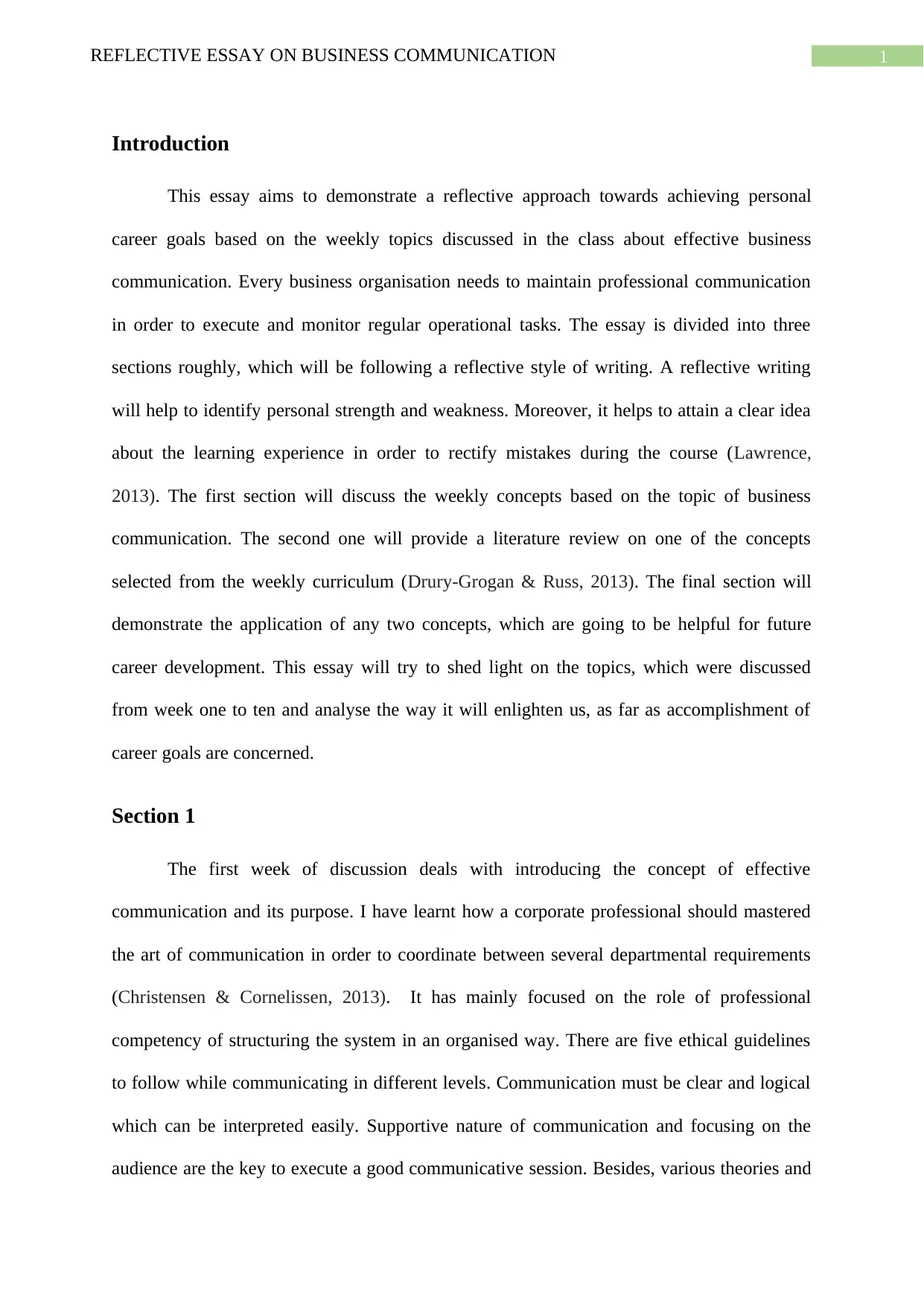
1REFLECTIVE ESSAY ON BUSINESS COMMUNICATION
Introduction
This essay aims to demonstrate a reflective approach towards achieving personal
career goals based on the weekly topics discussed in the class about effective business
communication. Every business organisation needs to maintain professional communication
in order to execute and monitor regular operational tasks. The essay is divided into three
sections roughly, which will be following a reflective style of writing. A reflective writing
will help to identify personal strength and weakness. Moreover, it helps to attain a clear idea
about the learning experience in order to rectify mistakes during the course (Lawrence,
2013). The first section will discuss the weekly concepts based on the topic of business
communication. The second one will provide a literature review on one of the concepts
selected from the weekly curriculum (Drury-Grogan & Russ, 2013). The final section will
demonstrate the application of any two concepts, which are going to be helpful for future
career development. This essay will try to shed light on the topics, which were discussed
from week one to ten and analyse the way it will enlighten us, as far as accomplishment of
career goals are concerned.
Section 1
The first week of discussion deals with introducing the concept of effective
communication and its purpose. I have learnt how a corporate professional should mastered
the art of communication in order to coordinate between several departmental requirements
(Christensen & Cornelissen, 2013). It has mainly focused on the role of professional
competency of structuring the system in an organised way. There are five ethical guidelines
to follow while communicating in different levels. Communication must be clear and logical
which can be interpreted easily. Supportive nature of communication and focusing on the
audience are the key to execute a good communicative session. Besides, various theories and
Introduction
This essay aims to demonstrate a reflective approach towards achieving personal
career goals based on the weekly topics discussed in the class about effective business
communication. Every business organisation needs to maintain professional communication
in order to execute and monitor regular operational tasks. The essay is divided into three
sections roughly, which will be following a reflective style of writing. A reflective writing
will help to identify personal strength and weakness. Moreover, it helps to attain a clear idea
about the learning experience in order to rectify mistakes during the course (Lawrence,
2013). The first section will discuss the weekly concepts based on the topic of business
communication. The second one will provide a literature review on one of the concepts
selected from the weekly curriculum (Drury-Grogan & Russ, 2013). The final section will
demonstrate the application of any two concepts, which are going to be helpful for future
career development. This essay will try to shed light on the topics, which were discussed
from week one to ten and analyse the way it will enlighten us, as far as accomplishment of
career goals are concerned.
Section 1
The first week of discussion deals with introducing the concept of effective
communication and its purpose. I have learnt how a corporate professional should mastered
the art of communication in order to coordinate between several departmental requirements
(Christensen & Cornelissen, 2013). It has mainly focused on the role of professional
competency of structuring the system in an organised way. There are five ethical guidelines
to follow while communicating in different levels. Communication must be clear and logical
which can be interpreted easily. Supportive nature of communication and focusing on the
audience are the key to execute a good communicative session. Besides, various theories and
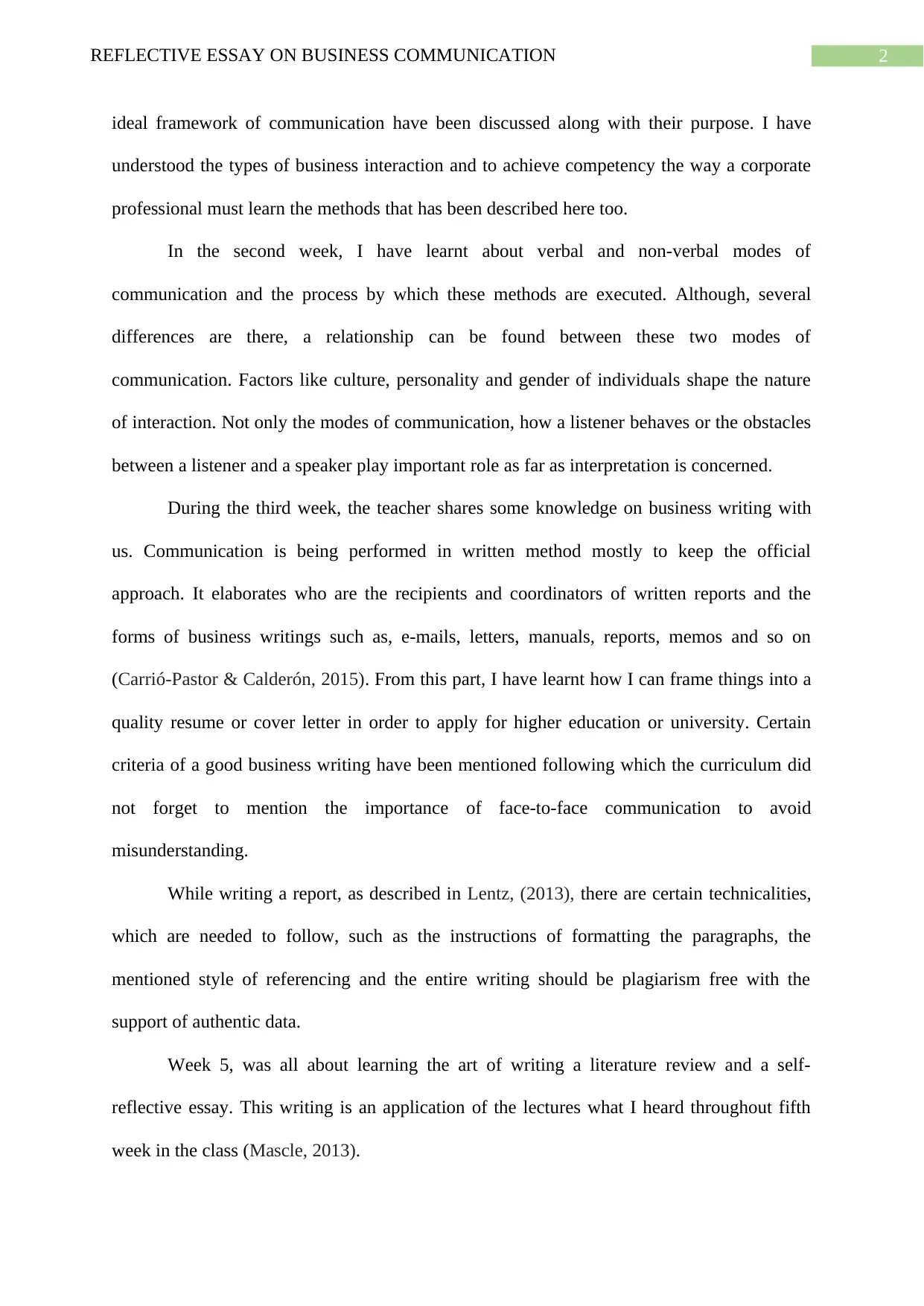
2REFLECTIVE ESSAY ON BUSINESS COMMUNICATION
ideal framework of communication have been discussed along with their purpose. I have
understood the types of business interaction and to achieve competency the way a corporate
professional must learn the methods that has been described here too.
In the second week, I have learnt about verbal and non-verbal modes of
communication and the process by which these methods are executed. Although, several
differences are there, a relationship can be found between these two modes of
communication. Factors like culture, personality and gender of individuals shape the nature
of interaction. Not only the modes of communication, how a listener behaves or the obstacles
between a listener and a speaker play important role as far as interpretation is concerned.
During the third week, the teacher shares some knowledge on business writing with
us. Communication is being performed in written method mostly to keep the official
approach. It elaborates who are the recipients and coordinators of written reports and the
forms of business writings such as, e-mails, letters, manuals, reports, memos and so on
(Carrió-Pastor & Calderón, 2015). From this part, I have learnt how I can frame things into a
quality resume or cover letter in order to apply for higher education or university. Certain
criteria of a good business writing have been mentioned following which the curriculum did
not forget to mention the importance of face-to-face communication to avoid
misunderstanding.
While writing a report, as described in Lentz, (2013), there are certain technicalities,
which are needed to follow, such as the instructions of formatting the paragraphs, the
mentioned style of referencing and the entire writing should be plagiarism free with the
support of authentic data.
Week 5, was all about learning the art of writing a literature review and a self-
reflective essay. This writing is an application of the lectures what I heard throughout fifth
week in the class (Mascle, 2013).
ideal framework of communication have been discussed along with their purpose. I have
understood the types of business interaction and to achieve competency the way a corporate
professional must learn the methods that has been described here too.
In the second week, I have learnt about verbal and non-verbal modes of
communication and the process by which these methods are executed. Although, several
differences are there, a relationship can be found between these two modes of
communication. Factors like culture, personality and gender of individuals shape the nature
of interaction. Not only the modes of communication, how a listener behaves or the obstacles
between a listener and a speaker play important role as far as interpretation is concerned.
During the third week, the teacher shares some knowledge on business writing with
us. Communication is being performed in written method mostly to keep the official
approach. It elaborates who are the recipients and coordinators of written reports and the
forms of business writings such as, e-mails, letters, manuals, reports, memos and so on
(Carrió-Pastor & Calderón, 2015). From this part, I have learnt how I can frame things into a
quality resume or cover letter in order to apply for higher education or university. Certain
criteria of a good business writing have been mentioned following which the curriculum did
not forget to mention the importance of face-to-face communication to avoid
misunderstanding.
While writing a report, as described in Lentz, (2013), there are certain technicalities,
which are needed to follow, such as the instructions of formatting the paragraphs, the
mentioned style of referencing and the entire writing should be plagiarism free with the
support of authentic data.
Week 5, was all about learning the art of writing a literature review and a self-
reflective essay. This writing is an application of the lectures what I heard throughout fifth
week in the class (Mascle, 2013).
⊘ This is a preview!⊘
Do you want full access?
Subscribe today to unlock all pages.

Trusted by 1+ million students worldwide
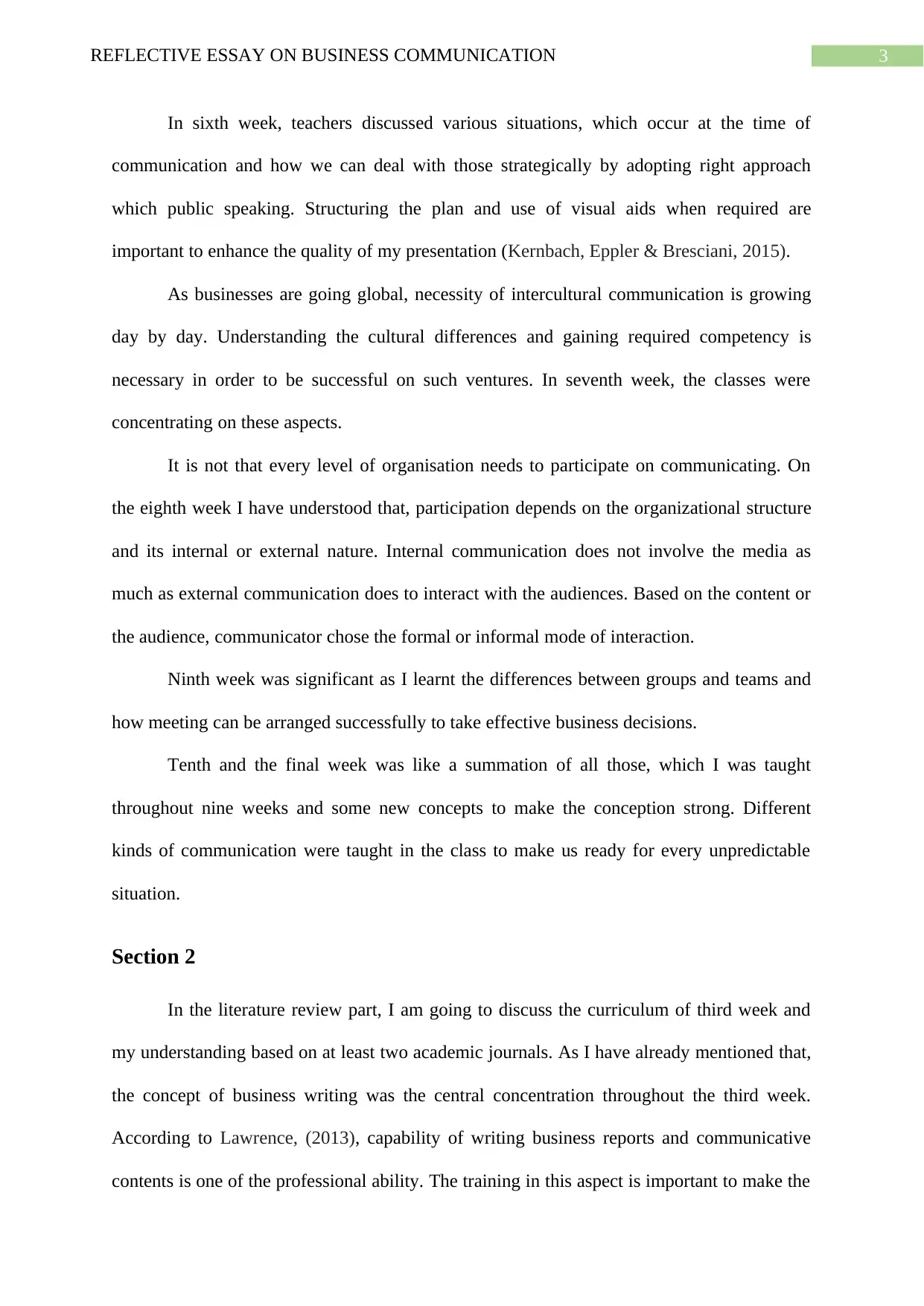
3REFLECTIVE ESSAY ON BUSINESS COMMUNICATION
In sixth week, teachers discussed various situations, which occur at the time of
communication and how we can deal with those strategically by adopting right approach
which public speaking. Structuring the plan and use of visual aids when required are
important to enhance the quality of my presentation (Kernbach, Eppler & Bresciani, 2015).
As businesses are going global, necessity of intercultural communication is growing
day by day. Understanding the cultural differences and gaining required competency is
necessary in order to be successful on such ventures. In seventh week, the classes were
concentrating on these aspects.
It is not that every level of organisation needs to participate on communicating. On
the eighth week I have understood that, participation depends on the organizational structure
and its internal or external nature. Internal communication does not involve the media as
much as external communication does to interact with the audiences. Based on the content or
the audience, communicator chose the formal or informal mode of interaction.
Ninth week was significant as I learnt the differences between groups and teams and
how meeting can be arranged successfully to take effective business decisions.
Tenth and the final week was like a summation of all those, which I was taught
throughout nine weeks and some new concepts to make the conception strong. Different
kinds of communication were taught in the class to make us ready for every unpredictable
situation.
Section 2
In the literature review part, I am going to discuss the curriculum of third week and
my understanding based on at least two academic journals. As I have already mentioned that,
the concept of business writing was the central concentration throughout the third week.
According to Lawrence, (2013), capability of writing business reports and communicative
contents is one of the professional ability. The training in this aspect is important to make the
In sixth week, teachers discussed various situations, which occur at the time of
communication and how we can deal with those strategically by adopting right approach
which public speaking. Structuring the plan and use of visual aids when required are
important to enhance the quality of my presentation (Kernbach, Eppler & Bresciani, 2015).
As businesses are going global, necessity of intercultural communication is growing
day by day. Understanding the cultural differences and gaining required competency is
necessary in order to be successful on such ventures. In seventh week, the classes were
concentrating on these aspects.
It is not that every level of organisation needs to participate on communicating. On
the eighth week I have understood that, participation depends on the organizational structure
and its internal or external nature. Internal communication does not involve the media as
much as external communication does to interact with the audiences. Based on the content or
the audience, communicator chose the formal or informal mode of interaction.
Ninth week was significant as I learnt the differences between groups and teams and
how meeting can be arranged successfully to take effective business decisions.
Tenth and the final week was like a summation of all those, which I was taught
throughout nine weeks and some new concepts to make the conception strong. Different
kinds of communication were taught in the class to make us ready for every unpredictable
situation.
Section 2
In the literature review part, I am going to discuss the curriculum of third week and
my understanding based on at least two academic journals. As I have already mentioned that,
the concept of business writing was the central concentration throughout the third week.
According to Lawrence, (2013), capability of writing business reports and communicative
contents is one of the professional ability. The training in this aspect is important to make the
Paraphrase This Document
Need a fresh take? Get an instant paraphrase of this document with our AI Paraphraser
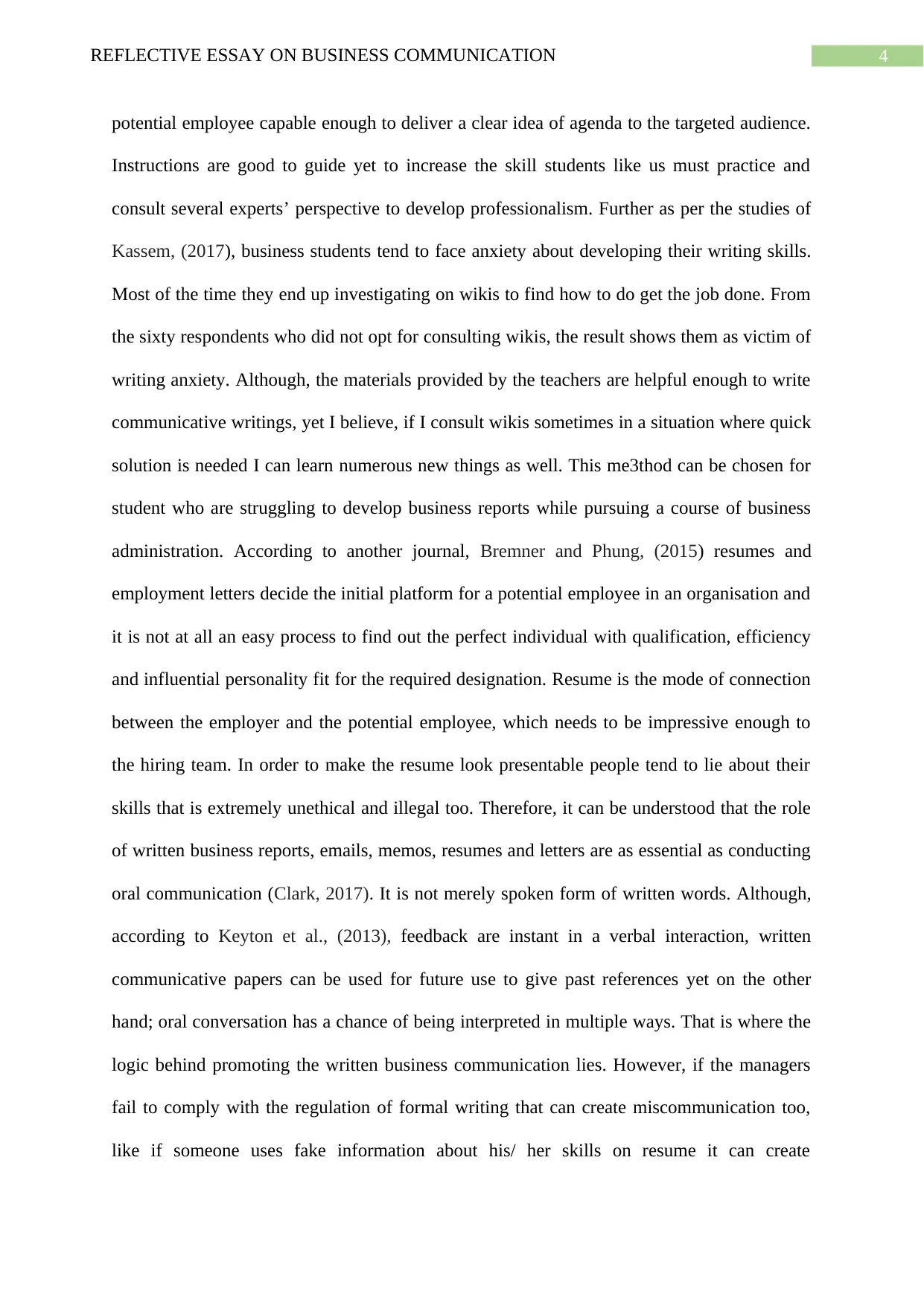
4REFLECTIVE ESSAY ON BUSINESS COMMUNICATION
potential employee capable enough to deliver a clear idea of agenda to the targeted audience.
Instructions are good to guide yet to increase the skill students like us must practice and
consult several experts’ perspective to develop professionalism. Further as per the studies of
Kassem, (2017), business students tend to face anxiety about developing their writing skills.
Most of the time they end up investigating on wikis to find how to do get the job done. From
the sixty respondents who did not opt for consulting wikis, the result shows them as victim of
writing anxiety. Although, the materials provided by the teachers are helpful enough to write
communicative writings, yet I believe, if I consult wikis sometimes in a situation where quick
solution is needed I can learn numerous new things as well. This me3thod can be chosen for
student who are struggling to develop business reports while pursuing a course of business
administration. According to another journal, Bremner and Phung, (2015) resumes and
employment letters decide the initial platform for a potential employee in an organisation and
it is not at all an easy process to find out the perfect individual with qualification, efficiency
and influential personality fit for the required designation. Resume is the mode of connection
between the employer and the potential employee, which needs to be impressive enough to
the hiring team. In order to make the resume look presentable people tend to lie about their
skills that is extremely unethical and illegal too. Therefore, it can be understood that the role
of written business reports, emails, memos, resumes and letters are as essential as conducting
oral communication (Clark, 2017). It is not merely spoken form of written words. Although,
according to Keyton et al., (2013), feedback are instant in a verbal interaction, written
communicative papers can be used for future use to give past references yet on the other
hand; oral conversation has a chance of being interpreted in multiple ways. That is where the
logic behind promoting the written business communication lies. However, if the managers
fail to comply with the regulation of formal writing that can create miscommunication too,
like if someone uses fake information about his/ her skills on resume it can create
potential employee capable enough to deliver a clear idea of agenda to the targeted audience.
Instructions are good to guide yet to increase the skill students like us must practice and
consult several experts’ perspective to develop professionalism. Further as per the studies of
Kassem, (2017), business students tend to face anxiety about developing their writing skills.
Most of the time they end up investigating on wikis to find how to do get the job done. From
the sixty respondents who did not opt for consulting wikis, the result shows them as victim of
writing anxiety. Although, the materials provided by the teachers are helpful enough to write
communicative writings, yet I believe, if I consult wikis sometimes in a situation where quick
solution is needed I can learn numerous new things as well. This me3thod can be chosen for
student who are struggling to develop business reports while pursuing a course of business
administration. According to another journal, Bremner and Phung, (2015) resumes and
employment letters decide the initial platform for a potential employee in an organisation and
it is not at all an easy process to find out the perfect individual with qualification, efficiency
and influential personality fit for the required designation. Resume is the mode of connection
between the employer and the potential employee, which needs to be impressive enough to
the hiring team. In order to make the resume look presentable people tend to lie about their
skills that is extremely unethical and illegal too. Therefore, it can be understood that the role
of written business reports, emails, memos, resumes and letters are as essential as conducting
oral communication (Clark, 2017). It is not merely spoken form of written words. Although,
according to Keyton et al., (2013), feedback are instant in a verbal interaction, written
communicative papers can be used for future use to give past references yet on the other
hand; oral conversation has a chance of being interpreted in multiple ways. That is where the
logic behind promoting the written business communication lies. However, if the managers
fail to comply with the regulation of formal writing that can create miscommunication too,
like if someone uses fake information about his/ her skills on resume it can create
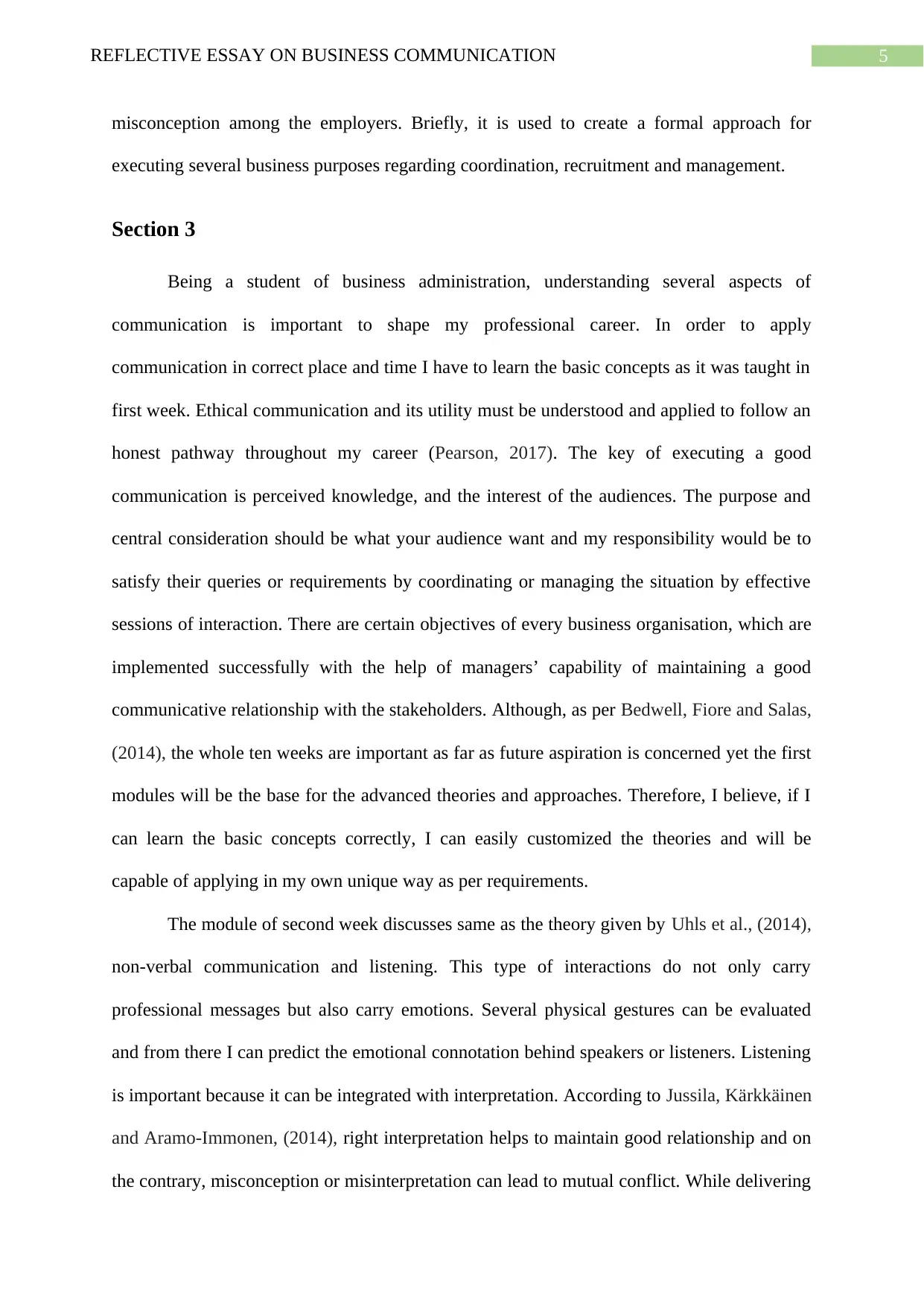
5REFLECTIVE ESSAY ON BUSINESS COMMUNICATION
misconception among the employers. Briefly, it is used to create a formal approach for
executing several business purposes regarding coordination, recruitment and management.
Section 3
Being a student of business administration, understanding several aspects of
communication is important to shape my professional career. In order to apply
communication in correct place and time I have to learn the basic concepts as it was taught in
first week. Ethical communication and its utility must be understood and applied to follow an
honest pathway throughout my career (Pearson, 2017). The key of executing a good
communication is perceived knowledge, and the interest of the audiences. The purpose and
central consideration should be what your audience want and my responsibility would be to
satisfy their queries or requirements by coordinating or managing the situation by effective
sessions of interaction. There are certain objectives of every business organisation, which are
implemented successfully with the help of managers’ capability of maintaining a good
communicative relationship with the stakeholders. Although, as per Bedwell, Fiore and Salas,
(2014), the whole ten weeks are important as far as future aspiration is concerned yet the first
modules will be the base for the advanced theories and approaches. Therefore, I believe, if I
can learn the basic concepts correctly, I can easily customized the theories and will be
capable of applying in my own unique way as per requirements.
The module of second week discusses same as the theory given by Uhls et al., (2014),
non-verbal communication and listening. This type of interactions do not only carry
professional messages but also carry emotions. Several physical gestures can be evaluated
and from there I can predict the emotional connotation behind speakers or listeners. Listening
is important because it can be integrated with interpretation. According to Jussila, Kärkkäinen
and Aramo-Immonen, (2014), right interpretation helps to maintain good relationship and on
the contrary, misconception or misinterpretation can lead to mutual conflict. While delivering
misconception among the employers. Briefly, it is used to create a formal approach for
executing several business purposes regarding coordination, recruitment and management.
Section 3
Being a student of business administration, understanding several aspects of
communication is important to shape my professional career. In order to apply
communication in correct place and time I have to learn the basic concepts as it was taught in
first week. Ethical communication and its utility must be understood and applied to follow an
honest pathway throughout my career (Pearson, 2017). The key of executing a good
communication is perceived knowledge, and the interest of the audiences. The purpose and
central consideration should be what your audience want and my responsibility would be to
satisfy their queries or requirements by coordinating or managing the situation by effective
sessions of interaction. There are certain objectives of every business organisation, which are
implemented successfully with the help of managers’ capability of maintaining a good
communicative relationship with the stakeholders. Although, as per Bedwell, Fiore and Salas,
(2014), the whole ten weeks are important as far as future aspiration is concerned yet the first
modules will be the base for the advanced theories and approaches. Therefore, I believe, if I
can learn the basic concepts correctly, I can easily customized the theories and will be
capable of applying in my own unique way as per requirements.
The module of second week discusses same as the theory given by Uhls et al., (2014),
non-verbal communication and listening. This type of interactions do not only carry
professional messages but also carry emotions. Several physical gestures can be evaluated
and from there I can predict the emotional connotation behind speakers or listeners. Listening
is important because it can be integrated with interpretation. According to Jussila, Kärkkäinen
and Aramo-Immonen, (2014), right interpretation helps to maintain good relationship and on
the contrary, misconception or misinterpretation can lead to mutual conflict. While delivering
⊘ This is a preview!⊘
Do you want full access?
Subscribe today to unlock all pages.

Trusted by 1+ million students worldwide
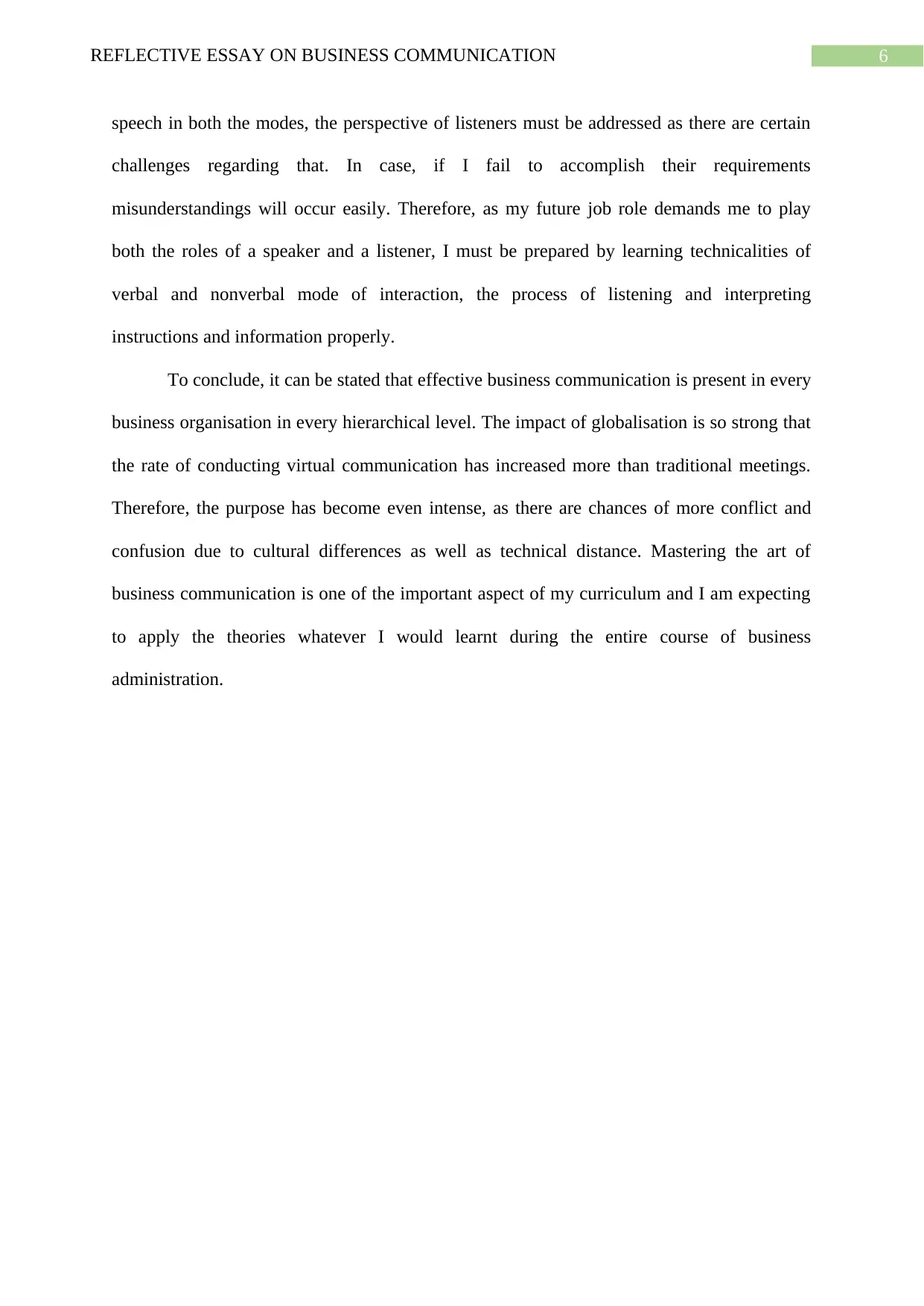
6REFLECTIVE ESSAY ON BUSINESS COMMUNICATION
speech in both the modes, the perspective of listeners must be addressed as there are certain
challenges regarding that. In case, if I fail to accomplish their requirements
misunderstandings will occur easily. Therefore, as my future job role demands me to play
both the roles of a speaker and a listener, I must be prepared by learning technicalities of
verbal and nonverbal mode of interaction, the process of listening and interpreting
instructions and information properly.
To conclude, it can be stated that effective business communication is present in every
business organisation in every hierarchical level. The impact of globalisation is so strong that
the rate of conducting virtual communication has increased more than traditional meetings.
Therefore, the purpose has become even intense, as there are chances of more conflict and
confusion due to cultural differences as well as technical distance. Mastering the art of
business communication is one of the important aspect of my curriculum and I am expecting
to apply the theories whatever I would learnt during the entire course of business
administration.
speech in both the modes, the perspective of listeners must be addressed as there are certain
challenges regarding that. In case, if I fail to accomplish their requirements
misunderstandings will occur easily. Therefore, as my future job role demands me to play
both the roles of a speaker and a listener, I must be prepared by learning technicalities of
verbal and nonverbal mode of interaction, the process of listening and interpreting
instructions and information properly.
To conclude, it can be stated that effective business communication is present in every
business organisation in every hierarchical level. The impact of globalisation is so strong that
the rate of conducting virtual communication has increased more than traditional meetings.
Therefore, the purpose has become even intense, as there are chances of more conflict and
confusion due to cultural differences as well as technical distance. Mastering the art of
business communication is one of the important aspect of my curriculum and I am expecting
to apply the theories whatever I would learnt during the entire course of business
administration.
Paraphrase This Document
Need a fresh take? Get an instant paraphrase of this document with our AI Paraphraser
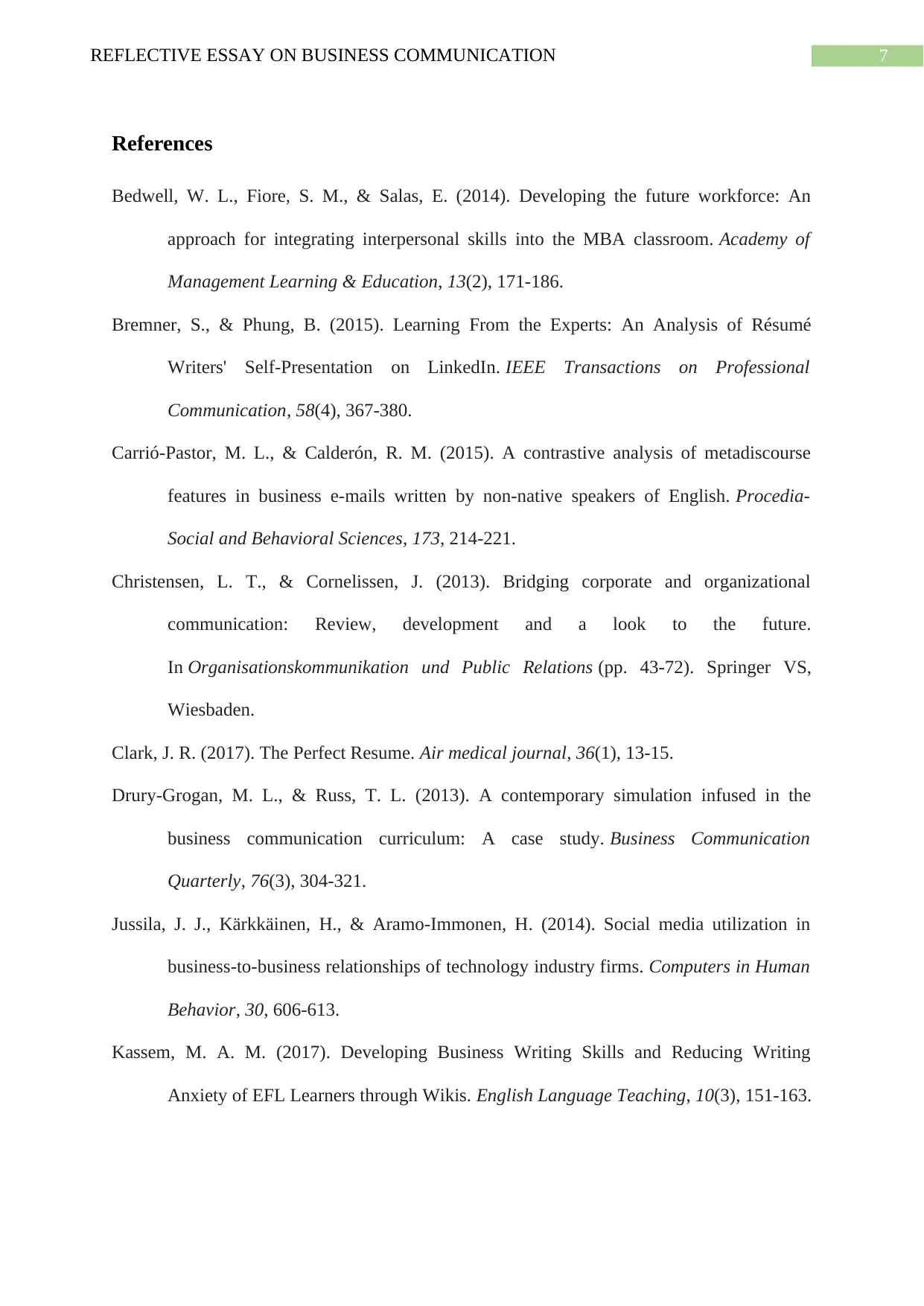
7REFLECTIVE ESSAY ON BUSINESS COMMUNICATION
References
Bedwell, W. L., Fiore, S. M., & Salas, E. (2014). Developing the future workforce: An
approach for integrating interpersonal skills into the MBA classroom. Academy of
Management Learning & Education, 13(2), 171-186.
Bremner, S., & Phung, B. (2015). Learning From the Experts: An Analysis of Résumé
Writers' Self-Presentation on LinkedIn. IEEE Transactions on Professional
Communication, 58(4), 367-380.
Carrió-Pastor, M. L., & Calderón, R. M. (2015). A contrastive analysis of metadiscourse
features in business e-mails written by non-native speakers of English. Procedia-
Social and Behavioral Sciences, 173, 214-221.
Christensen, L. T., & Cornelissen, J. (2013). Bridging corporate and organizational
communication: Review, development and a look to the future.
In Organisationskommunikation und Public Relations (pp. 43-72). Springer VS,
Wiesbaden.
Clark, J. R. (2017). The Perfect Resume. Air medical journal, 36(1), 13-15.
Drury-Grogan, M. L., & Russ, T. L. (2013). A contemporary simulation infused in the
business communication curriculum: A case study. Business Communication
Quarterly, 76(3), 304-321.
Jussila, J. J., Kärkkäinen, H., & Aramo-Immonen, H. (2014). Social media utilization in
business-to-business relationships of technology industry firms. Computers in Human
Behavior, 30, 606-613.
Kassem, M. A. M. (2017). Developing Business Writing Skills and Reducing Writing
Anxiety of EFL Learners through Wikis. English Language Teaching, 10(3), 151-163.
References
Bedwell, W. L., Fiore, S. M., & Salas, E. (2014). Developing the future workforce: An
approach for integrating interpersonal skills into the MBA classroom. Academy of
Management Learning & Education, 13(2), 171-186.
Bremner, S., & Phung, B. (2015). Learning From the Experts: An Analysis of Résumé
Writers' Self-Presentation on LinkedIn. IEEE Transactions on Professional
Communication, 58(4), 367-380.
Carrió-Pastor, M. L., & Calderón, R. M. (2015). A contrastive analysis of metadiscourse
features in business e-mails written by non-native speakers of English. Procedia-
Social and Behavioral Sciences, 173, 214-221.
Christensen, L. T., & Cornelissen, J. (2013). Bridging corporate and organizational
communication: Review, development and a look to the future.
In Organisationskommunikation und Public Relations (pp. 43-72). Springer VS,
Wiesbaden.
Clark, J. R. (2017). The Perfect Resume. Air medical journal, 36(1), 13-15.
Drury-Grogan, M. L., & Russ, T. L. (2013). A contemporary simulation infused in the
business communication curriculum: A case study. Business Communication
Quarterly, 76(3), 304-321.
Jussila, J. J., Kärkkäinen, H., & Aramo-Immonen, H. (2014). Social media utilization in
business-to-business relationships of technology industry firms. Computers in Human
Behavior, 30, 606-613.
Kassem, M. A. M. (2017). Developing Business Writing Skills and Reducing Writing
Anxiety of EFL Learners through Wikis. English Language Teaching, 10(3), 151-163.
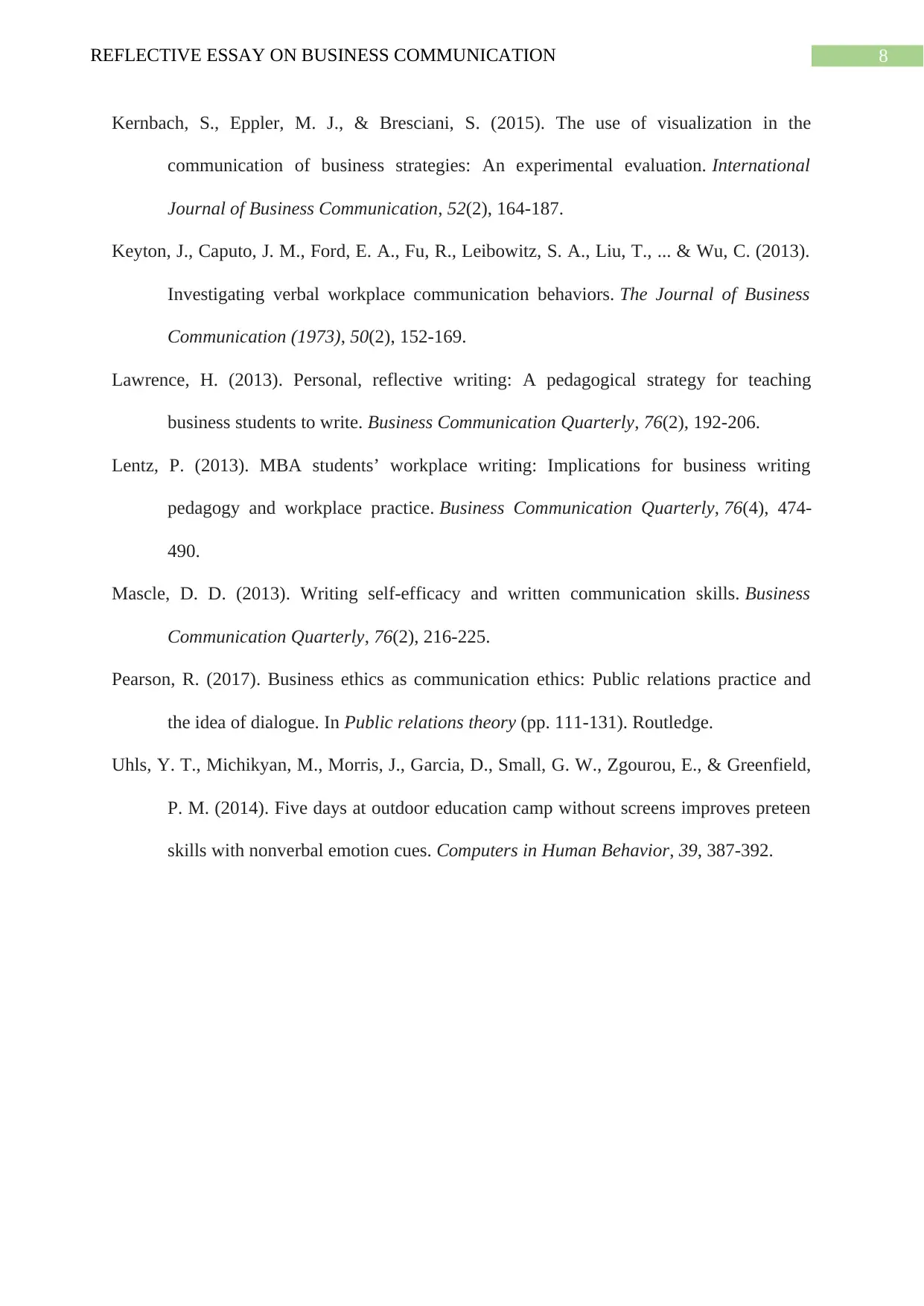
8REFLECTIVE ESSAY ON BUSINESS COMMUNICATION
Kernbach, S., Eppler, M. J., & Bresciani, S. (2015). The use of visualization in the
communication of business strategies: An experimental evaluation. International
Journal of Business Communication, 52(2), 164-187.
Keyton, J., Caputo, J. M., Ford, E. A., Fu, R., Leibowitz, S. A., Liu, T., ... & Wu, C. (2013).
Investigating verbal workplace communication behaviors. The Journal of Business
Communication (1973), 50(2), 152-169.
Lawrence, H. (2013). Personal, reflective writing: A pedagogical strategy for teaching
business students to write. Business Communication Quarterly, 76(2), 192-206.
Lentz, P. (2013). MBA students’ workplace writing: Implications for business writing
pedagogy and workplace practice. Business Communication Quarterly, 76(4), 474-
490.
Mascle, D. D. (2013). Writing self-efficacy and written communication skills. Business
Communication Quarterly, 76(2), 216-225.
Pearson, R. (2017). Business ethics as communication ethics: Public relations practice and
the idea of dialogue. In Public relations theory (pp. 111-131). Routledge.
Uhls, Y. T., Michikyan, M., Morris, J., Garcia, D., Small, G. W., Zgourou, E., & Greenfield,
P. M. (2014). Five days at outdoor education camp without screens improves preteen
skills with nonverbal emotion cues. Computers in Human Behavior, 39, 387-392.
Kernbach, S., Eppler, M. J., & Bresciani, S. (2015). The use of visualization in the
communication of business strategies: An experimental evaluation. International
Journal of Business Communication, 52(2), 164-187.
Keyton, J., Caputo, J. M., Ford, E. A., Fu, R., Leibowitz, S. A., Liu, T., ... & Wu, C. (2013).
Investigating verbal workplace communication behaviors. The Journal of Business
Communication (1973), 50(2), 152-169.
Lawrence, H. (2013). Personal, reflective writing: A pedagogical strategy for teaching
business students to write. Business Communication Quarterly, 76(2), 192-206.
Lentz, P. (2013). MBA students’ workplace writing: Implications for business writing
pedagogy and workplace practice. Business Communication Quarterly, 76(4), 474-
490.
Mascle, D. D. (2013). Writing self-efficacy and written communication skills. Business
Communication Quarterly, 76(2), 216-225.
Pearson, R. (2017). Business ethics as communication ethics: Public relations practice and
the idea of dialogue. In Public relations theory (pp. 111-131). Routledge.
Uhls, Y. T., Michikyan, M., Morris, J., Garcia, D., Small, G. W., Zgourou, E., & Greenfield,
P. M. (2014). Five days at outdoor education camp without screens improves preteen
skills with nonverbal emotion cues. Computers in Human Behavior, 39, 387-392.
⊘ This is a preview!⊘
Do you want full access?
Subscribe today to unlock all pages.

Trusted by 1+ million students worldwide
1 out of 9
Related Documents
Your All-in-One AI-Powered Toolkit for Academic Success.
+13062052269
info@desklib.com
Available 24*7 on WhatsApp / Email
![[object Object]](/_next/static/media/star-bottom.7253800d.svg)
Unlock your academic potential
Copyright © 2020–2026 A2Z Services. All Rights Reserved. Developed and managed by ZUCOL.


